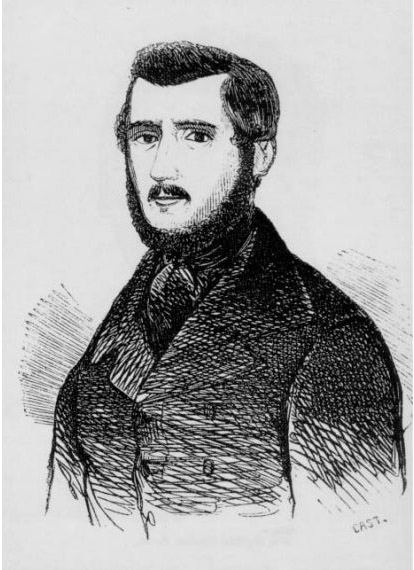Pedro Unanue
Pedro Unanue
15 August 1814 Ondarroa – 3 January 1846 Trieste

Born in a small town in the Basque Country, Unanue began studying music and voice at an early age with a local organist. In 1831,
he intended to travel to South America, but got stuck en route in Santander, where he soon sang in the cathedral choir. In 1834, he went to
Madrid, but wasn't accepted into the conservatory because its director thought his voice was too powerful. (Our 21st century is not the first
one to prefer small-time singers over singers with real voices.)
The impresario of the Teatro de la Cruz, Ramón Carnicer, accepted Unanue into his choir, while the young singer perfected his technique
with the retired army officer turned voice teacher José María Reart de Copons, who would later also teach Manuel Carrion. In March 1836, Carnicer allowed him to sing his first main role, Pollione. His first major
success came exactly three years later, in La straniera. Carnicer's troupe, Unanue included, also toured Spain, and appeared
particularly in Cádiz, Sevilla and Málaga; Unanue's repertory was focused on Donizetti and Rossini, but included also some of
the first Spanish operas. Other than with Carnicer's troupe, he also appeared at the Teatro del Principe in Madrid.
In 1842, he got a contract in Granada; he was now undisputedly Spain's greatest tenor. He spent 1844 in St. Petersburg at the Mariinskij,
where he was hugely successful, and became a protégé of Rubini. In 1845, he was first
tenor in Bergamo, and in winter 1845/46 in Trieste. For the next season, he had a contract at the Théâtre des Italiens in Paris,
when he fell ill and died in Trieste, at age 31.
Reference
Picture source
Repertory
Auber
Le domino noir – Madrid, 1840
Bellini
Norma – Madrid, 1836
La straniera – Madrid, 1839
Ducassi
Gabriela di Vergy – Madrid, 1839
Donizetti
Lucrezia Borgia – Madrid, 1839
L'esule di Roma – Madrid, 1839
Lucia di Lammermmor – Málaga, 1841
Marino Faliero – Cádiz, 1841
Gemma di Vergy – Granada, 1842
Alina, regina di Golconda – Madrid, 1842
L'elisir d'amore – Madrid, 1842
Belisario – Cádiz, 1840
La favorite – Madrid, 1844
Linda di Chamounix – Sankt-Peterburg, 1844
Fausta – Sevilla, 1843
Eslaba
El solitario – Cádiz, 1841
Las treguas de Ptolemaida – Madrid, 1841
Nicolai
Il templario – Granada, 1842
Mercadante
I briganti – Madrid, 1840
Il giuramento – Madrid, 1840
Elena da Feltre – Madrid, 1843
Pacini
Saffo – Sevilla, 1843
Medea – Trieste, 1845
Ricci, Luigi
Chiara di Rosenberg – Madrid, 1839
Un'avventura di Scaramuccia – Madrid, 1839
Rossini
Le conte Ory – Madrid, 1840
Otello – Madrid, 1840
Mosé – Madrid, 1840
Il barbiere di Siviglia – Cádiz, 1841
Corradino – Granada, 1842
Saldoni
Cleonice, regina di Siria – Madrid, 1840
Ipermestra – Cádiz, 1840
Ventura Sánchez
La conjuración de Venecia – Cádiz, 1840
Verdi
I due Foscari – Bergamo, 1845
Reference for the repertory: Nino Dentici Burgoa/Juan Antonio Zubikarai Erkiaga: Memorias de Don Pedro Unanue, Bilbao, 1994
|
